My final project is based on conditional design, since that is what my essay was also about
I started my project by creating a brief mind map to help me organise my ideas and my process in the development of the project. I used a website called Mindmup in order to do it.
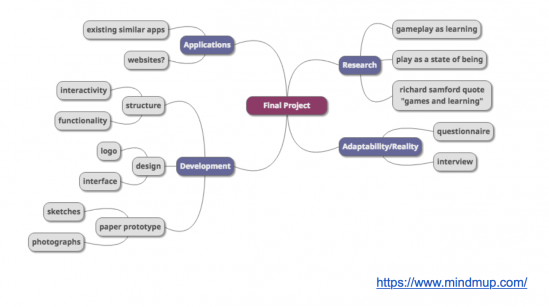
Once I had my mind map ready, I started researching for my project. The first thing I did was pick out a quote to inspire it; one that was shown to us in the Games lecture and that really struck with me.
"Learning by playing games… is a process of constant practice and interaction in progressively more challenging tasks through which players gradually reveal underlying sets and systems of rules.” - Richard Sanford & Ben Williamson in Games and Learning
Given this, the idea to create an app that would encourage this learning process through gaming came to me, but rather than it being learning for children or with a specific subject, it would be learning how to function as an adult, for people over 18 who are having some trouble grasping the straws of adulthood, in order to feel motivated to do menial life tasks.
The first thing I did once I had the idea was research gameplay and its relation to learning, and I found interesting information from the Institute of Play.
The Institute of Play
“[Games] use data to help players understand how they are doing, what they need to work on and where to go next. Games create a compelling need to know, a need to ask, examine, assimilate and master certain skills and content areas. Some experts argue that games are, first and foremost, learning systems, and that this accounts for the sense of engagement and entertainment players experience.”
“Much of the activity of play consists in failing to reach the goal established by a game’s rules. And yet players rarely experience this failure as an obstacle to trying again and again, as they work toward mastery. There is something in play that gives players permission to take risks considered outlandish or impossible in “real life.” There is something in play that activates the tenacity and persistence required for effective learning.”
More research led me to discover that there are three key questions towards gameplay, and I tried to answer them with my idea in mind:
• Can I try? Can I join in?
As an app, this game would be downloadable by anybody that owns a smartphone, be it Android or Apple.
• Can I save it?
The beauty of a game whose purpose is to connect real life to gameplay is that while you are able to save your process and thus, satisfying the second stage of the learning process through gaming, you will also be saving the knowledge and accomplishments in yourself, to apply in real life.
• Want me to show you how?
The ultimate goal for this app would be to successfully encourage a person to feel confident in their ability to complete daily tasks, and then impart their knowledge to somebody else.
This information I got from the following article:
http://dmlcentral.net/wp-content/uploads/files/Apple.pdf
Once I had enough research to continue, I decided that it would be useful to investigate what other similar apps already exist that encourage the same thing, or very similarly, and to look at what I consider their successes and their failures, and see how mine can differ or improve.
I found two apps that were the most similar and that I thought worked in a way that I appreciated:
Irunurun
Irunurun is an app that encourages you to get things done. Their mottos are "actions speak louder than goals" and, my personal favourite. "We are what we repeatedly do. Excellence therefore is not an act, but a habit," which is a quote by Aristotle.
They also have a very engaging video that describes what they do and encourages you to download their app, which I will link to below.
Video |
Website
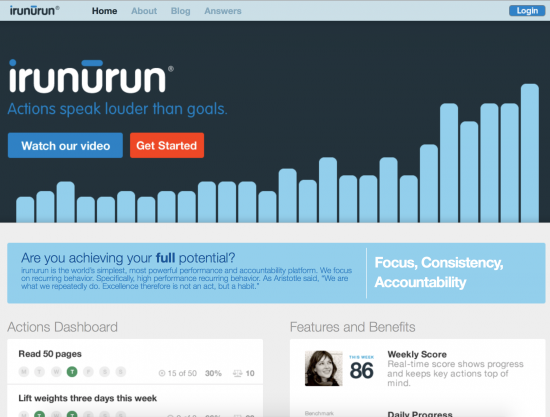
The second app that I enjoyed was much more similar to what I wanted to achieve with my app, since it was absolutely game-oriented.
Habitica:
“Habitica is a free habit building and productivity app that treats your real life like a game. With in-game rewards and punishments to motivate you and a strong social network to inspire you, Habitica can help you achieve your goals to become healthy, hard-working, and happy.”
I made a list of pros and cons of the app, however, to see what I could be inspired from and what I could improve upon:
Pros:
• Good grasp on the real-life to game concept that I want (instant gratification)
• Rewards can be acquired by completing tasks and randomly
• Customization options are gained
• Achievement badges
• Very interactive - the process is engaging
Cons:
• Too much focus on RPG-style language and gaming. I want something that may appeal to a wider audience.
• Design seems outdated with the pixelated images.
• No option to follow a designated path. You have to manually input all of your tasks.
• Your player can ‘die’ - this may be very discouraging.
• Successes and failures are measured in ‘Health’ and ‘XP’ which is too limited
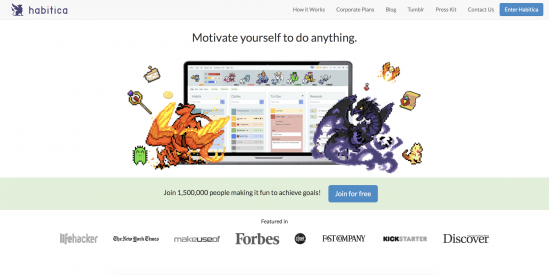
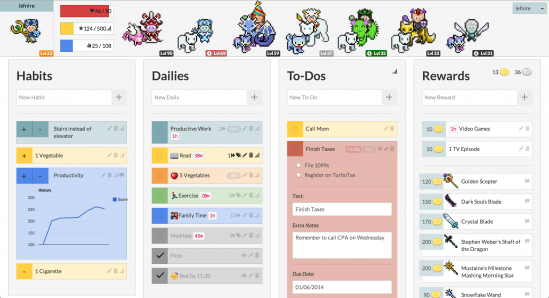
Other honourable mentions of apps that were similar:
• GoalsonTrack: works with goals but lacks in design
• LifeTick: works with goals, includes interactivity with externals, also lacks in design
• Habit List: works with goals and counts ‘streaks’
• Lift: premise that goals are achieved by being held accountable, personal coach, reviews and interaction with externals - not what I would like to promote
• StickK: goals dependent on money you put on the line - way too harsh
Next, I decided to look at a program I am very familiar with, The Sims, which I wanted to draw ideas from for the app.
The Sims
In the sims, skills can be learned, which unlock further interactions. Several of these are irrelevant to daily life for the majority of people, such as the Alchemy skill, so I have compiled a list of the relevant and useful skills from The Sims 3 and The Sims 4:
• Charisma
• Cooking/Baking
• Fitness
• Handiness
• Logic
• Mischief
• Music
• Painting
• Social Networking
• Video Gaming
• Writing
The following are additional skills I’d want to incorporate:
• Animal Interaction
• Cleaning
• Creativity
• Health
• Learning
• Organization
• Safety
• Social
• Relationship
I want to create an app that converts your real life into a game by rewarding daily tasks and menial accomplishments with points, skills, and additional bonuses in order to encourage the user’s motivation and personal satisfaction in their day-to-day life.
So I set out to create a task list for myself, as follows:
• Gather research and investigate books and authors on the subject of gameplay as a learning procedure
• Perform experiment on learning via lecture vs learning via game? How viable would this be?
• Survey potential audiences to garner interest in such an app
• Paper prototype
• Digitalise prototype
Since I had already done some research on gameplay for learning, and since I found that the experiment of lecturing people was too complicated to go through with, I set out to write a survey in order to figure out what people thought and wanted.
The survey can be found here:
Survey Link
It involved questions such as "On a scale of 1-5, how difficult is it for you to complete daily tasks? Such as chores, homework, etc.?" and "Would it be easier for you to complete daily tasks if you were rewarded for them?"
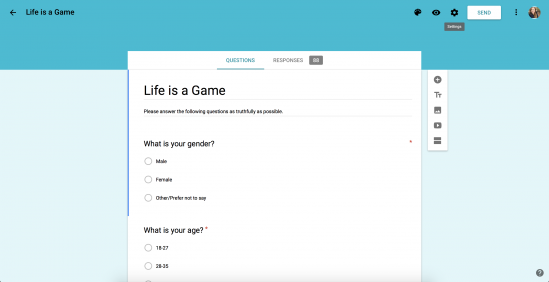
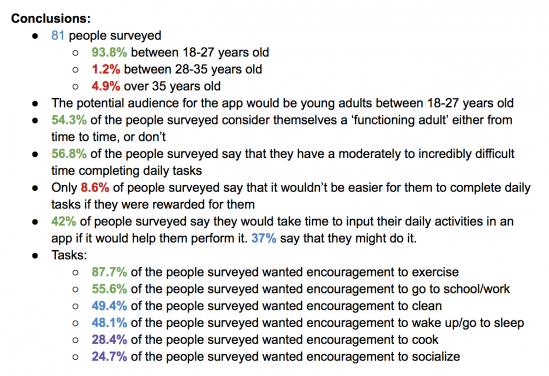
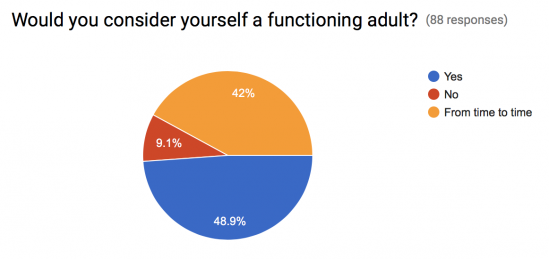
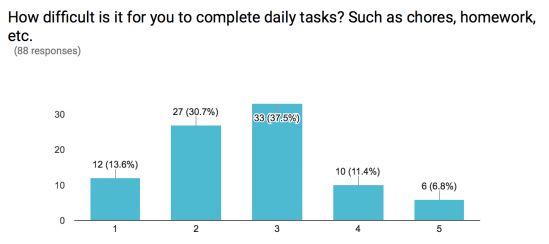
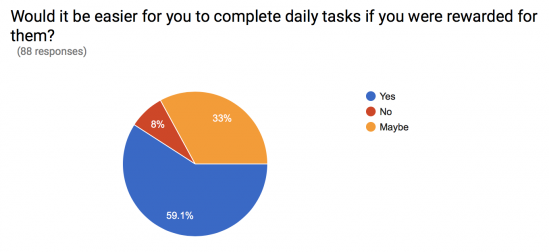
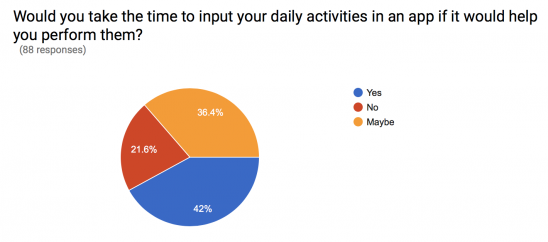
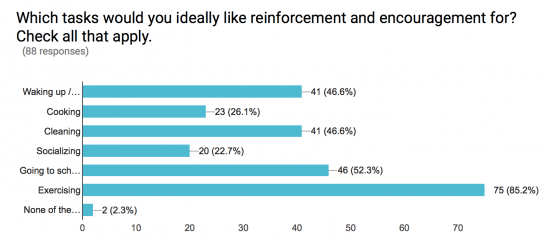
Once I had these answers, I had enough material to start creating a wireframe for the app, which would include all of the screens that my app needed in order to work. This is what I came up with:
Then, I looked up the dimensions of a typical iPhone 6 screen, which is what I had decided to work with, and found them to be:
• iPhone 6 screen: 4.7in diagonally
• Width: 750px
• Height: 1334px
Then, I drew the layout for one route of my wireframe, so as to create a paper prototype.
Once I had these, I moved to my laptop and began to digitalise them using Adobe Illustrator. They could have just as easily been done using Gimp or another software, but since I have the Adobe package and am more comfortable with it, I used that one instead.
When I had finished digitalising all of the screens that I had drawn, I compiled them together to make an animated gif showing the progress through which a person could start the app, sign up, and begin using it. This was my final product: